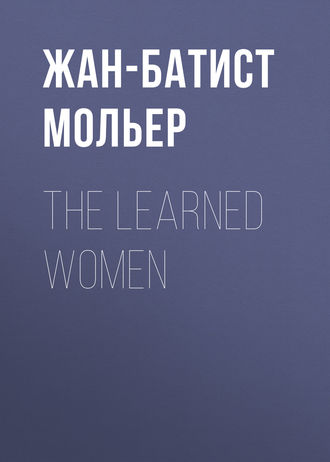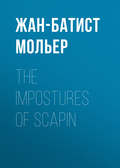
Мольер (Жан-Батист Поклен)
The Learned Women
SCENE IV. – BÉLISE, CLITANDRE
CLI. Suffer a lover, Madam, to profit by such a propitious moment to reveal to you his sincere devotion…
BEL. Ah! gently! Beware of opening your heart too freely to me; although I have placed you in the list of my lovers, you must use no interpreter but your eyes, and never explain by another language desires which are an insult to me. Love me; sigh for me; burn for my charms; but let me know nothing of it. I can shut my eyes to your secret flame, as long as you keep yourself to dumb interpreters; but if your mouth meddle in the matter, I must for ever banish you from my sight.
CLI. Do not be alarmed at the intentions of my heart. Henriette is, Madam, the object of my love, and I come ardently to conjure you to favour the love I have for her.
BEL. Ah! truly now, the subterfuge shows excellent wit. This subtle evasion deserves praise; and in all the romances I have glanced over, I have never met with anything more ingenious.
CLI. This is no attempt at wit, Madam; it is the avowal of what my heart feels. Heaven has bound me to the beauty of Henriette by the ties of an unchangeable love. Henriette holds me in her lovely chains; and to marry Henriette is the end of all my hopes. You can do much towards it; and what I have come to ask you is that you will condescend to second my addresses.
BEL. I see the end to which your demand would gently head, and I understand whom you mean under that name. The metaphor is clever; and not to depart from it, let me tell you that Henriette rebels against matrimony, and that you must love her without any hope of having your love returned.
CLI. But, Madam, what is the use of such a perplexing debate? Why will you persist in believing what is not?
BEL. Dear me! Do not trouble yourself so much. Leave off denying what your looks have often made me understand. Let it suffice that I am content with the subterfuge your love has so skilfully adopted, and that under the figure to which respect has limited it, I am willing to suffer its homage; always provided that its transports, guided by honour, offer only pure vows on my altars.
CLI. But…
BEL. Farewell. This ought really to satisfy you, and I have said more than I wished to say.
CLI. But your error…
BEL. Leave me. I am blushing now; and my modesty has had much to bear.
CLI. May I be hanged if I love you; and… [Footnote: Molière ends this line with sage, with, apparently, no other motive than to find a rhyme to davantage.]
BEL. No, no. I will hear nothing more.
SCENE V. – CLITANDRE (alone)
Deuce take the foolish woman with her dreams! Was anything so preposterous ever heard of? I must go and ask the help of a person of more sense.
ACT II
SCENE I. – ARISTE (leaving CLITANDRE, and still speaking to him)
Yes; I will bring you an answer as soon as I can. I will press, insist, do all that should be done. How many things a lover has to say when one would suffice; and how impatient he is for all that he desires! Never…
SCENE II. – CHRYSALE, ARISTE
ARI. Good day to you, brother.
CHRY. And to you also, brother.
ARI. Do you know what brings me here?
CHRY. No, I do not; but I am ready to hear it, if it pleases you to tell me.
ARI. You have known Clitandre for some time now?
CHRY. Certainly; and he often comes to our house.
ARI. And what do you think of him?
CHRY. I think him to be a man of honour, wit, courage, and uprightness, and I know very few people who have more merit.
ARI. A certain wish of his has brought me here; and I am glad to see the esteem you have for him.
CHRY. I became acquainted with his late father when I was in Rome.
ARI. Ah!
CHRY. He was a perfect gentleman.
ARI. So it is said.
CHRY. We were only about twenty-eight years of age, and, upon my word, we were, both of us, very gay young fellows.
ARI. I believe it.
CHRY. We greatly affected the Roman ladies, and everybody there spoke of our pranks. We made many people jealous, I can tell you.
ARI. Excellent; but let us come to what brings me here.
SCENE III. – BÉLISE (entering softly and listening), CHRYSALE, ARISTE
ARI. Clitandre has chosen me to be his interpreter to you; he has fallen in love with Henriette.
CHRY. What! with my daughter?
ARI. Yes. Clitandre is delighted with her, and you never saw a lover so smitten!
BEL. (to ARISTE). No, no; you are mistaken. You do not know the story, and the thing is not as you imagine.
ARI. How so, sister?
BEL. Clitandre deceives you; it is with another that he is in love.
ARI. It is not with Henriette that he is in love? You are joking.
BEL. No; I am telling the perfect truth.
ARI. He told me so himself.
BEL. Doubtless.
ARI. You see me here, sister, commissioned by him to ask her of her father.
BEL. Yes, I know.
ARI. And he besought me, in the name of his love, to hasten the time of an alliance so desired by him.
BEL. Better and better. No more gallant subterfuge could have been employed. But let me tell you that Henriette is an excuse, an ingenious veil, a pretext, brother, to cover another flame, the mystery of which I know; and most willingly will I enlighten you both.
ARI. Since you know so much, sister, pray tell us whom he loves.
BEL. You wish to know?
ARI. Yes; who is it? BEL. Me!
ARI. You!
BEL. Myself.
ARI. Come, I say! sister!
BEL. What do you mean by this "Come, I say"? And what is there so wonderful in what I tell you? I am handsome enough, I should think, to have more than one heart in subjection to my empire; and Dorante, Damis, Cléonte, and Lycidas show well enough the power of my charms.
ARI. Do those men love you?
BEL. Yes; with all their might.
ARI. They have told you so?
BEL. No one would take such a liberty; they have, up to the present time, respected me so much that they have never spoken to me of their love. But the dumb interpreters have done their office in offering their hearts and lives to me.
ARI. I hardly ever see Damis here.
BEL. It is to show me a more respectful submission.
ARI. Dorante, with sharp words, abuses you everywhere.
BEL. It is the transport of a jealous passion.
ARI. Cléonte and Lycidas are both married.
BEL. It was the despair to which I had reduced their love.
ARI. Upon my word, sister, these are mere visions.
CHRY. (to BÉLISE). You had better get rid of these idle fancies.
BEL. Ah! idle fancies! They are idle fancies, you think. I have idle fancies! Really, "idle fancies" is excellent. I greatly rejoice at those idle fancies, brothers, and I did not know that I was addicted to idle fancies.
SCENE IV. – CHRYSALE, ARISTE
CHRY. Our sister is decidedly crazy.
ARI. It grows upon her every day. But let us resume the subject that brings me here. Clitandre asks you to give him Henriette in marriage. Tell me what answer we can make to his love.
CHRY. Do you ask it? I consent to it with all my heart; and I consider his alliance a great honour.
ARI. You know that he is not wealthy, that…
CHRY. That is a thing of no consequence. He is rich in virtue, and that is better than wealth. Moreover, his father and I were but one mind in two bodies.
ARI. Let us speak to your wife, and try to render her favourable to…
CHRY. It is enough. I accept him for my son-in-law.
ARI. Yes; but to support your consent, it will not be amiss to have her agree to it also. Let us go…
CHRY. You are joking? There is no need of this. I answer for my wife, and take the business upon myself.
ARI. But…
CHRY. Leave it to me, I say, and fear nothing. I will go, and prepare her this moment.
ARI. Let it be so. I will go and see Henriette on the subject, and will return to know…
CHRY. It is a settled thing, and I will go without delay and talk to my wife about it.
SCENE V. – CHRYSALE, MARTINE
MAR. Just like my luck! Alas! they be true sayings, they be – "Give a dog a bad name and hang him," and – "One doesn't get fat in other folk's service." [Footnote: Or, more literally, "Service is no inheritance;" but this does not sound familiar enough in English.]
CHRY. What is it? What is the matter with you, Martine?
MAR. What is the matter?
CHRY. Yes.
MAR. The matter is that I am sent away, Sir.
CHRY. Sent away?
MAR. Yes; mistress has turned me out.
CHRY. I don't understand; why has she?
MAR. I am threatened with a sound beating if I don't go.
CHRY. No; you will stop here. I am quite satisfied with you. My wife is a little hasty at times, and I will not, no…
SCENE VI. – PHILAMINTE, BÉLISE, CHRYSALE, MARTINE
PHI. (seeing MARTINE). What! I see you here, you hussy! Quick, leave this place, and never let me set my eyes upon you again.
CHRY. Gently.
PHI. No; I will have it so.
CHRY. What?
PHI. I insist upon her going.
CHRY. But what has she done wrong, that you wish her in this way to…?
PHI. What! you take her part?
CHRY. Certainly not.
PHI. You side with her against me?
CHRY. Oh! dear me, no; I only ask what she is guilty of.
PHI. Am I one to send her away without just cause?
CHRY. I do not say that; but we must, with servants…
PHI. No; she must leave this place, I tell you.
CHRY. Let it be so; who says anything to the contrary?
PHI. I will have no opposition to my will.
CHRY. Agreed.
PHI. And like a reasonable husband, you should take my part against her, and share my anger.
CHRY. So I do. (Turning towards MARTINE.) Yes; my wife is right in sending you away, baggage that you are; your crime cannot be forgiven.
MAR. What is it I have done, then?
CHRY. (aside). Upon my word, I don't know.
PHI. She is capable even now of looking upon it as nothing.
CHRY. Has she caused your anger by breaking some looking-glass or some china?
PHI. Do you think that I would send her away for that? And do you fancy that I should get angry for so little?
CHRY. (to MARTINE). What is the meaning of this? (To
PHILAMINTE) The thing is of great importance, then?
PHI. Certainly; did you ever find me unreasonable?
CHRY. Has she, through carelessness, allowed some ewer or silver dish to be stolen from us?
PHI. That would be of little moment.
CHRY. (to MARTINE). Oh! oh! I say, Miss! (To PHILAMINTE)
What! has she shown herself dishonest?
PHI. It is worse than that.
CHRY. Worse than that?
PHI. Worse.
CHRY. (to MARTINE). How the deuce! you jade. (To
PHILAMINTE) What! has she…?
PHI. She has with unparalleled impudence, after thirty lessons, insulted my ear by the improper use of a low and vulgar word condemned in express terms by Vaugelas. [Footnote: The French grammarian, born about 1585; died 1650.]
CHRY. Is that…?
PHI. What! In spite of our remonstrances to be always sapping the foundation of all knowledge – of grammar which rules even kings, and makes them, with a high hand, obey her laws.
CHRY. I thought her guilty of the greatest crime.
PHI. What! You do not think the crime unpardonable?
CHRY. Yes, yes.
PHI. I should like to see you excuse her.
CHRY. Heaven forbid!
BEL. It is really pitiful. All constructions are destroyed by her; yet she has a hundred times been told the laws of the language.
MAR. All that you preach there is no doubt very fine, but I don't understand your jargon, not I.
PHI. Did you ever see such impudence? To call a language founded on reason and polite custom a jargon!
MAR. Provided one is understood, one speaks well enough, and all your fine speeches don't do me no good.
PHI. You see! Is not that her way of speaking, don't do me no good!
BEL. O intractable brains! How is it that, in spite of the trouble we daily take, we cannot teach you to speak with congruity? In putting not with no, you have spoken redundantly, and it is, as you have been told, a negative too many.
MAR. Oh my! I ain't no scholar like you, and I speak straight out as they speaks in our place.
PHI. Ah! who can bear it?
BEL. What a horrible solecism!
PHI. It is enough to destroy a delicate ear.
BEL. You are, I must acknowledge, very dull of understanding; they is in the plural number, and speaks is in the singular. Will you thus all your life offend grammar? [Footnote: Grammaire in Molière's time was pronounced as grand'mère is now. Gammer seems the nearest approach to this in English.]
MAR. Who speaks of offending either gammer or gaffer?
PHI. O heavens!
BEL. The word grammar is misunderstood by you, and I have told you a hundred times where the word comes from.
MAR. Faith, let it come from Chaillot, Auteuil, or Pontoise, [Footnote: In Molière's time villages close to Paris.] I care precious little.
BEL. What a boorish mind! Grammar teaches us the laws of the verb and nominative case, as well as of the adjective and substantive.
MAR. Sure, let me tell you, Ma'am, that I don't know those people.
PHI. What martyrdom!
BEL. They are names of words, and you ought to notice how they agree with each other.
MAR. What does it matter whether they agree or fall out?
PHI. (to BÉLISE). Goodness gracious! put an end to such a discussion. (To CHRYSALE) And so you will not send her away?
CHRY. Oh! yes. (Aside) I must put up with her caprice, Go, don't provoke her, Martine.
PHI. How! you are afraid of offending the hussy! you speak to her in quite an obliging tone.
CHRY. I? Not at all. (In a rough tone) Go, leave this place. (In a softer tone) Go away, my poor girl.






